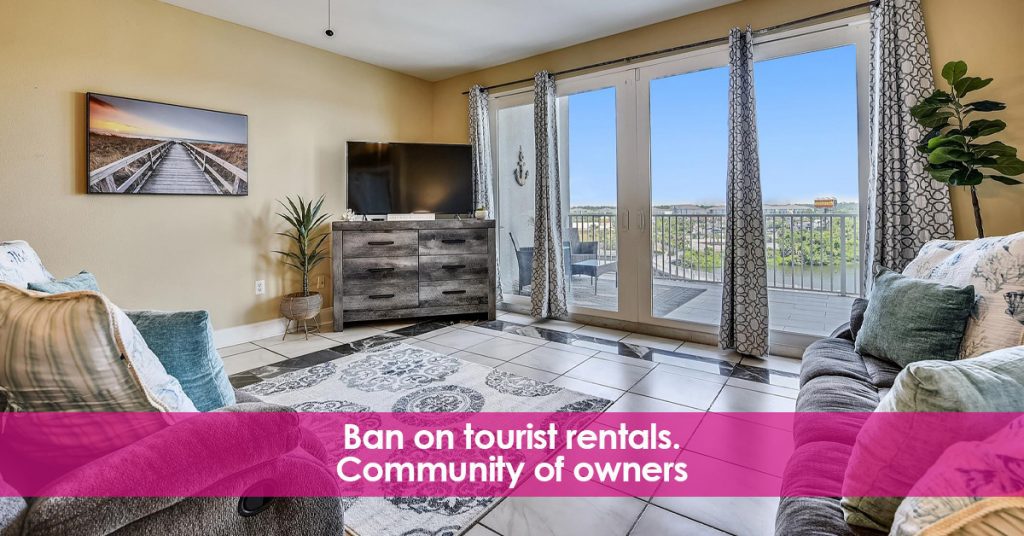Tourist rentals have been a hot topic of debate for years. This activity has caused numerous issues in homeowners’ associations, as the leisure activities of tourists clash with the need for rest of residents. Some would say they are outright incompatible. Late-night noise, loud music, shouting, littering, and antisocial behaviour in common areas are common complaints. In addition, tourist/holiday rentals have worsened Spain’s housing crisis. Until now, it wasn’t clear whether the Horizontal Property Law allowed community of owners to ban tourist rentals or merely restrict or condition them. Two recent Spanish Supreme Court rulings have finally addressed this issue, which we explain below.
Article 17.12 of the Horizontal Property Law: A complex interpretation.
Since 2019, art. 17.12 of the Horizontal Property Law allows homeowners’ associations to “limit or condition” tourist rentals with a 3/5 majority of votes and quotas. However, the interpretation of this article has always been unclear, with different courts and provincial hearings offering contradictory rulings. Some courts argued that “limit” or “condition” did not mean “ban,” while others believed a total ban was possible. There was also debate over whether a unanimous vote was required or if a qualified 3/5 majority sufficed. This uncertainty has led to significant legal ambiguity for years. After five long years, the Spanish Supreme Court has now resolved these differences.
Supreme Court Rulings 1.232/2024 and 1.233/2024: A qualified majority can ban tourist rentals.
The Supreme Court has clarified that tourist rentals can be banned in homeowners’ associations governed by the Horizontal Property Law. Also, that this decision can be made with a qualified majority (3/5 of votes and quotas) without needing unanimity. While Article 33 of the Spanish Constitution recognizes individual property rights, the Court made it clear that these rights are not absolute and are subject to restrictions protecting the collective interests of the community. In summary, banning holiday rentals is legitimate and does not violate individual property rights.
What will happen with tourist rentals now?.
First, it’s important to note that such tourist rental bans are not retroactive. Meaning that a ban will not affect owners who were granted licenses before the ban was approved. However, it is still uncertain what will happen when tourist homes try to renew their licenses. The Valencian Community has recently approved a new decree that establishes the obligation to renew the tourist license every five years. Therefore, it is possible that renewals are denied when the community of owners has prohibited this type of rental through a community agreement.
Additionally, it seems that in the coming months, a nationwide obligation will be approved to obtain an identification number in the Property Registry for tourist homes. This means that only homes with this identification can be advertised on digital platforms like BOOKING, AIRBNB, etc. However, the scope of this new regulation remains to be seen.
Conclusión.
At White-Baos Lawyers, we specialize in Horizontal Property Law and Tourist Rentals. If you are affected by this issue and would like expert legal advice, do not hesitate to contact us.
The information provided in this article is not intended to be legal advice, but merely conveys information relating to legal issues.
Carlos Baos (Lawyer)
White & Baos.
Tel: +34 966 426 185
E-mail: info@white-baos.com
White & Baos 2024 – All Rights Reserved.

Good evening,
Thanks for this. I have an appartment in a small town in the Valencia community, with the town and complex basically 90% of the time empty. The community banned me from renting (via changing statutes) after getting the license (all northern Europeans, they only have it for holiday purposes and want no other people there). How can I still rent my appartment after 2029? Basically it’s worthless now, because the license will expire. I cannot rent for less than 10 days after 2029 and for more than 10 days it should be work related (and there is nobody interested in long term rental there). The appartment will be empty, no one is willing to buy it and maybe some crimes will take place. Is it correct what I am thinking?